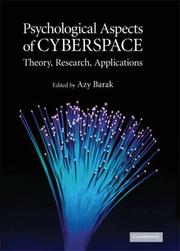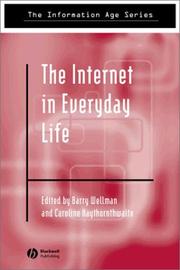| Listing 1 - 10 of 47 | << page >> |
Sort by
|
Book
ISBN: 9788599662496 Year: 2008 Publisher: SciELO Books - Centro Edelstein
Abstract | Keywords | Export | Availability | Bookmark
 Loading...
Loading...Choose an application
- Reference Manager
- EndNote
- RefWorks (Direct export to RefWorks)
This work attempts to advance in the elaboration of public policies based on the empirical analysis of the dynamics of digital inclusion / exclusion in the poorest sectors of the population, based on extensive quantitative and qualitative research in low-income neighbourhoods in the municipality of Rio de Janeiro.
Internet and the poor --- Internet users --- Social conditions. --- Web users --- World Wide Web users --- Computer users --- Personal Internet use in the workplace --- Poor and the Internet --- Poor --- Centro Edelstein
Book
ISBN: 1784502960 9781784502966 9781785927126 Year: 2016 Publisher: London Jessica Kingsley Publishers
Abstract | Keywords | Export | Availability | Bookmark
 Loading...
Loading...Choose an application
- Reference Manager
- EndNote
- RefWorks (Direct export to RefWorks)
Internet addiction --- Internet users --- Web users --- World Wide Web users --- Computer users --- Personal Internet use in the workplace --- Addiction, Internet --- Addiction to the Internet --- Addictive use of the Internet --- Compulsive Internet use --- Compulsive behavior --- Prevention. --- Mental health.
Book
ISBN: 3958453619 9783958453616 3958453600 9783958453609 Publisher: [Place of publication not identified] MITP.
Abstract | Keywords | Export | Availability | Bookmark
 Loading...
Loading...Choose an application
- Reference Manager
- EndNote
- RefWorks (Direct export to RefWorks)
Metriken analysieren und interpretieren Besucherverhalten verstehen und auswerten Digital-Ziele definieren, Webauftritt optimieren und den Erfolg steigern Digital Analytics bezeichnet die Sammlung, Analyse und Auswertung von Daten der Nutzung aller digitalen Kanäle. Das Ziel dabei ist, diese Informationen zum besseren Verständnis des Besucherverhaltens sowie zur Optimierung der gesamten digitalen Internetpräsenz zu nutzen. Je nach Ausrichtung des jeweiligen Digitalkanals – z.B. die Steigerung der Anzahl von Kontaktanfragen, Leads oder Bestellungen auf einer Website oder auch die Vermittlung eines Markenwerts – können Sie anhand von Analytics herausfinden, wo sich Schwachstellen befinden und wie Sie Ihre eigenen Ziele durch entsprechende Optimierungen besser erreichen. Marco Hassler gibt Ihnen sowohl eine schrittweise Einführung als auch einen umfassenden Einblick in die Tiefe der Analytics-Metriken. Mit diesem Buch finden Sie z.B. heraus, welche Traffic-Quelle die wertvollsten Besucher bringt oder welche Bereiche der Website besonders verkaufsfördernd wirken. Auf diese Weise werden Sie Ihre Besucher sowie deren Verhalten und Motivation besser kennenlernen, Ihre Digitalkanäle darauf abstimmen und somit Ihren digitalen Erfolg steigern können. Darüber hinaus schlägt das Buch auch die Brücke zu angrenzenden Themenbereichen wie Usability, User Centered Design, Customer Journey, Online Branding, Social Media, Digital Marketing und Suchmaschinenoptimierung. Ziel dieses Buches ist es, konkrete Digital-Analytics-Kenntnisse zu vermitteln. Marco Hassler gibt Ihnen klare Ratschläge und Anleitungen, wie Sie Ihre Ziele erreichen, sowie wertvolle praxisorientierte Tipps Aus dem Inhalt: Teil I: Basis schaffen und Website-Nutzung messen Funktionsweise von Digital-Analytics-Systemen Datensammlung, -speicherung, -auswertung Teil II: Metriken analysieren und interpretieren Traffic-Quellen Besuchereigenschaften Besucherverhalten: Besuchsdauer und -tiefe, Klickverhalten, Besucherfluss Inhaltsnutzung: Ein- und Ausstiegsseiten, Attraktivität einer Seite Digitalkanäle: Website, Mobile Apps, Social Media, Blogs, Videos, One-Pagers Metriken nutzen: Beobachten, Vergleichen, Nachforschen und Segmentieren Teil III: Website optimieren und den Erfolg steigern Digital-Ziele definieren Zielerreichung und Conversion Key Performance Indicators Trichteranalyse
Web usage mining. --- Internet users --- Web users --- World Wide Web users --- Computer users --- Personal Internet use in the workplace --- Analysis, Web usage --- Analytics, Web --- Mining, Web usage --- Web analytics --- Web usage analysis --- Data mining --- Statistics --- Data processing.

ISBN: 9780511813740 9780521873017 9780521694643 9780511464911 0511464916 9780511460524 051146052X 9780511465628 0511465629 9780511463389 0511463383 0511813740 0511464177 9780511464171 0521873010 0521694647 9780511461842 0511461844 1107180988 1281982342 9786611982348 051146259X Year: 2008 Publisher: Cambridge New York Cambridge University Press
Abstract | Keywords | Export | Availability | Bookmark
 Loading...
Loading...Choose an application
- Reference Manager
- EndNote
- RefWorks (Direct export to RefWorks)
Hundreds of millions of people across the world use the Internet every day. Its functions vary, from shopping and banking to chatting and dating. From a psychological perspective, the Internet has become a major vehicle for interpersonal communication that can significantly affect people's decisions, behaviors, attitudes and emotions. Moreover, its existence has created a virtual social environment in which people can meet, negotiate, collaborate and exchange goods and information. Cyberspace is not just a technical device but a phenomenon which has reduced the world to a proverbial global village, fostering collaborations and international cooperations; thus reducing the barriers of geographical distance and indigenous cultures. Azy Barak and a team of prominent social scientists review a decade of scientific investigations into the social, behavioral and psychological aspects of cyberspace, collating state-of-the-art knowledge in each area. Together they develop emerging conceptualizations and envisage directions and applications for future research.
Cyberspace --- Internet users --- Web users --- World Wide Web users --- Computer users --- Personal Internet use in the workplace --- Space and time --- Computers --- Telematics --- Psychological aspects. --- Psychology. --- Health Sciences --- Psychiatry & Psychology
Book
ISBN: 9783960675877 3960675879 3960670877 9783960670872 Year: 2017 Publisher: Hamburg Anchor Academic Publishing
Abstract | Keywords | Export | Availability | Bookmark
 Loading...
Loading...Choose an application
- Reference Manager
- EndNote
- RefWorks (Direct export to RefWorks)
Web usage mining. --- Internet users. --- Web users --- World Wide Web users --- Computer users --- Personal Internet use in the workplace --- Analysis, Web usage --- Analytics, Web --- Mining, Web usage --- Web analytics --- Web usage analysis --- Data mining
Book
ISBN: 9780857855046 0857855042 9780857855701 0857855700 0857855425 9780857855428 0857857630 1474218903 1003085342 100018966X 1000183033 9781003085348 9781000186277 100018627X 9781000189667 9781000183030 9781474218900 9780857857637 9780857857637 Year: 2015 Publisher: London
Abstract | Keywords | Export | Availability | Bookmark
 Loading...
Loading...Choose an application
- Reference Manager
- EndNote
- RefWorks (Direct export to RefWorks)
"The internet has become embedded into our daily lives, no longer an esoteric phenomenon, but instead an unremarkable way of carrying out our interactions with one another. Online and offline are interwoven in everyday experience. Using the internet has become accepted as a way of being present in the world, rather than a means of accessing some discrete virtual domain. Ethnographers of these contemporary internet-infused societies consequently find themselves facing serious methodological dilemmas: where should they go, what should they do there and how can they acquire robust knowledge about what people do in, through and with the internet? This book presents an overview of the challenges faced by ethnographers who wish to understand activities that involve the internet. Suitable for both new and experienced ethnographers, it explores both methodological principles and practical strategies for coming to terms with the definition of field sites, the connections between online and offline and the changing nature of embodied experience. Examples are drawn from a wide range of settings, including ethnographies of scientific institutions, television and social media, and locally-based gift-giving networks."--
Internet --- Internautes --- Ethnologie --- Aspect social --- Recherche --- Méthodologie --- Internet users. --- Ethnology --- #SBIB:39A2 --- Web users --- World Wide Web users --- Computer users --- Personal Internet use in the workplace --- Social aspects. --- Research --- Methodology. --- Antropologie: methoden en technieken --- Social aspects --- Internautes. --- Aspect social. --- Recherche. --- Méthodologie. --- Ethnology. --- Internet users --- Cultural anthropology --- Ethnography --- Races of man --- Social anthropology --- Anthropology --- Human beings --- Research&delete& --- Methodology --- Internet - Social aspects
Book
ISBN: 0124046940 0124046193 9780124046948 9780124046191 Year: 2013 Publisher: Amsterdam Morgan Kaufmann, an imprint of Elsevier
Abstract | Keywords | Export | Availability | Bookmark
 Loading...
Loading...Choose an application
- Reference Manager
- EndNote
- RefWorks (Direct export to RefWorks)
Practical Web Analytics for User Experience teaches you how to use web analytics to help answer the complicated questions facing UX professionals. Within this book, you'll find a quantitative approach for measuring a website's effectiveness and the methods for posing and answering specific questions about how users navigate a website. The book is organized according to the concerns UX practitioners face. Chapters are devoted to traffic, clickpath, and content use analysis, measuring the effectiveness of design changes, including A/B testing, building user profiles based on search hab
Internet users -- Attitudes. --- Web sites -- Development. --- Web usage mining. --- Web usage mining --- Internet users --- Web sites --- Social Sciences --- Library & Information Science --- Attitudes --- Development --- Web site development. --- Attitudes. --- Development of Web sites --- Web users --- World Wide Web users --- Analysis, Web usage --- Analytics, Web --- Mining, Web usage --- Web analytics --- Web usage analysis --- Internet programming --- Computer users --- Personal Internet use in the workplace --- Data mining

ISBN: 0631235086 0631235078 9780631235088 Year: 2002 Publisher: Malden Blackwell
Abstract | Keywords | Export | Availability | Bookmark
 Loading...
Loading...Choose an application
- Reference Manager
- EndNote
- RefWorks (Direct export to RefWorks)
Internet users --- Internet users. --- Computer architecture. Operating systems --- Internet --- Social aspects --- Social aspects. --- #SBIB:309H103 --- Web users --- World Wide Web users --- Mediatechnologie / ICT / digitale media: sociale en culturele aspecten --- Computer users --- Personal Internet use in the workplace --- Internet - Social aspects --- Internautes --- Aspect social
Book
ISBN: 9783631754856 Year: 2008 Publisher: Frankfurt am Main, Germany: Frankfurt am Main, Germany: Peter Lang, Peter Lang,
Abstract | Keywords | Export | Availability | Bookmark
 Loading...
Loading...Choose an application
- Reference Manager
- EndNote
- RefWorks (Direct export to RefWorks)
The study focuses on user satisfaction with websites and personalised internet applications in particular. The abundance of information on the web is increasing more and more. Therefore, the significance of websites targeting the users’ preferences, like personalised Internet applications, is rising. The aim of this study was to find out which factors determine user satisfaction with personalised internet applications. Factors like the usefulness of the information or trust towards how personal information is handled were considered. A large-scale user survey evaluating three internet applications (from the travel, e-learning and real estate domains) was conducted. Expert opinions were collected to complement the results and provide insights from users’ and experts’ points of views.
Internet users --- Consumer satisfaction --- Online information services --- Attitudes. --- Evaluation. --- Electronic information services --- On-line information services --- Online services (Information services) --- Information services --- Customer satisfaction --- Satisfaction --- Brand loyalty --- Customer loyalty --- Web users --- World Wide Web users --- Computer users --- Personal Internet use in the workplace
Book
ISBN: 9788599662465 Year: 2008 Publisher: SciELO Books - Centro Edelstein
Abstract | Keywords | Export | Availability | Bookmark
 Loading...
Loading...Choose an application
- Reference Manager
- EndNote
- RefWorks (Direct export to RefWorks)
This work seeks to advance in the development of public policies, based on an empirical analysis of the dynamics of digital inclusion / exclusion in the poorest sectors of the population, based on extensive quantitative and qualitative research in low-income communities, in the municipality of Rio de Janeiro.
Internet and the poor --- Internet users --- Digital divide --- Internet --- Social aspects --- DARPA Internet --- Internet (Computer network) --- Wide area networks (Computer networks) --- World Wide Web --- Divide, Digital --- GDD (Global digital divide) --- Global digital divide --- Information society --- Web users --- World Wide Web users --- Computer users --- Personal Internet use in the workplace --- Poor and the Internet --- Poor --- POLITICAL SCIENCE
| Listing 1 - 10 of 47 | << page >> |
Sort by
|

 Search
Search Feedback
Feedback About UniCat
About UniCat  Help
Help News
News